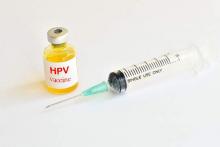Increased awareness did not increase adolescent HPV vaccination rates in a high-risk population, according to Jessica Fishman, PhD, of the University of Pennsylvania, Philadelphia, and her associates.
The study sample included 211 low-income adolescents, aged 13-18 years, and 149 parents of different adolescents, aged 9-18 years, who had not been vaccinated for HPV. In the adolescent group, 3% received an HPV vaccination after 3 months, 9% received a vaccination after 6 months, and 15% received a vaccination after 1 year. In the parent group, 5% had their daughters vaccinated after 3 months, 10% had their daughters vaccinated after 6 months, and 13% had their daughters vaccinated after 1 year.
Awareness was measured using a questionnaire asking about individual awareness of HPV, cervical cancer, HPV vaccination, and news or advertising about HPV vaccination. Both adolescents and parents were most aware of cervical cancer (73% and 94%, respectively) and least aware of news about HPV advertising (51% and 66%, respectively). A total of 14% of adolescents and 4% of parents had no awareness of any questionnaire item, while 32% of adolescents and 57% of parents had awareness of all items.
Probability of vaccination was less than 0.5 for all levels of awareness, and accuracy of HPV vaccination prediction models was poor, Dr. Fishman and her associates noted.
“For this high-risk population where vaccination is rare, evidence-based behavioral interventions are urgently needed. Ideally, interventions will target variables associated with vaccination. Interventions that do not target actual determinants can have no effect or even a ‘boomerang’ effect that increases unhealthy behavior,” the investigators concluded.
Find the full study in Pediatrics (doi: 10.1542/peds.2015-2048).


